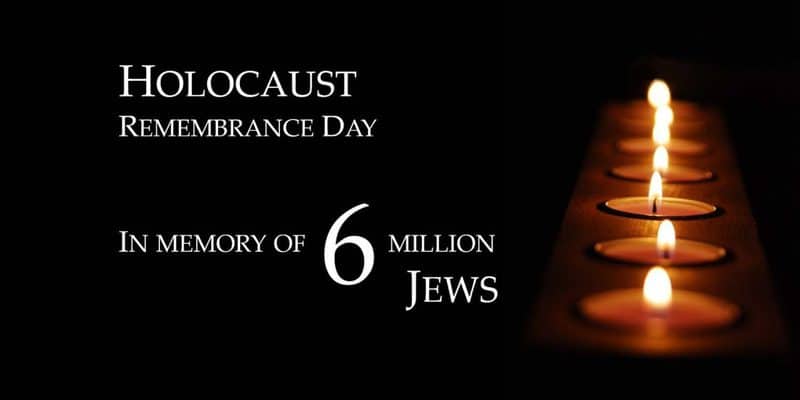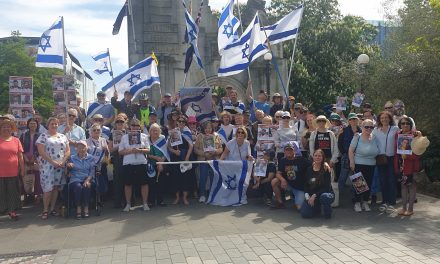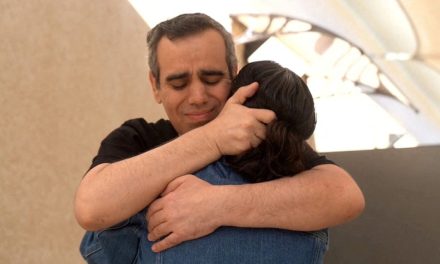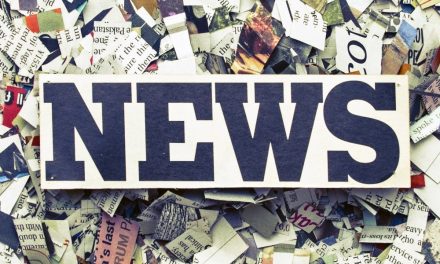By Miriam Bell…
Tales of survivor resilience dominated this year’s commemoration of United Nations International Holocaust Remembrance Day at the Auckland War Memorial Museum.
That’s because the designated focus of the event was to recognise the importance of Holocaust refugees to New Zealand.
It was a focus that had particular resonance for me. My maternal grandparents, Ernst Mandl and Hermione Mandl, along with my grandfather’s cousin and his wife, Frank and Rachel Monk, escaped from Czechoslovakia (as it was then) to New Zealand in 1939 as the storm clouds gathered over Europe.
They managed to rebuild their lives in New Zealand and actively contributed to their adopted country, with Rachel in particular earning a public profile for her work as a GP and at Turangawaewae with Princess Te Puea.
While the transition to Kiwi life was not an easy one for any of them, they all considered themselves lucky to have gained entry to New Zealand – and to have been given the chance of a new life, an opportunity denied to so many, including their own families, who instead perished.
To echo the words used by Holocaust Centre of NZ chair Deborah Hart in telling the stories of her forebears at the commemoration, their story was both unique and terribly ordinary. It was a story that was repeated over and over, millions of times.
As the number of living Holocaust survivors inevitably falls, the memories – and knowledge – of the Holocaust are fading. Yet we are living in times where the rise in anti-semitism, racism, nationalism and hatred is all too evident.
These are times when the rallying call of “never again” is more important than ever. Times when the need to remember the Holocaust and all its victims is critical. Because it is true that those who fail to learn from history are condemned to repeat it.
It is this that gives the educative work of the Holocaust Centre, and others working in the Holocaust remembrance area, such significance and urgency. It is also what lies behind the annual commemoration of UN International Holocaust Remembrance Day.
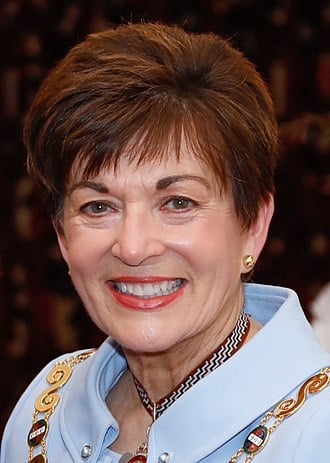
Governor-General Dame Patsy Reddy [pictured above], who is the patron of the Holocaust Centre, said this year it was about honouring the survivors of the genocide enacted by the Nazi regime, whose lives were a testament to strength and the human spirit.
Keeping the memory of the Holocaust alive is crucial, she said. That is why she endorses the work of the Holocaust Centre, an important part of which is their efforts to make sure that all New Zealand students study the Holocaust before they leave school.
“But we must walk into the future with our eyes wide open to the past. So while the Holocaust took place in Europe, we must also learn from our own country’s shameful history of behaviour towards Jewish refugees.”
Most people are not aware that over 70% of the applications received from Jewish people seeking to migrate to New Zealand in the years leading up to, and then during, World War II were denied, Dame Reddy said.
“Thousands more were actively discouraged from applying to get into New Zealand. Jewish people were not recognised as refugees before the war and applications from British people were openly favoured. So the cards were stacked against them.”
Just 1200 Holocaust refugees managed to gain entry to New Zealand and, on settling here, many of them encountered hostility, especially if they spoke German.
Dame Reddy said that continued even after the war when the horrors of the Holocaust were known, yet the refugees perserved and New Zealand has benefited immeasurably from their many and varied contributions.
It is necessary to educate young New Zealanders on their history, to encourage them to stand up for those being persecuted, to speak out against racism and anti-semitism, and to embrace refugees, she continued.
“We need to harness the sense of social responsibility that we have seen in response to Covid 19. It is an opportunity to create an even more inclusive society which ensures that everyone, no matter where they come from, is treated with respect and dignity.
“It is in this way we can honour both the victims and the survivors of the Holocaust.”
The Governor-General’s message of learning from history and educating people to be upstanders, to fight against persecution and to be inclusive of others was reiterated by all of the speakers at the commemoration.
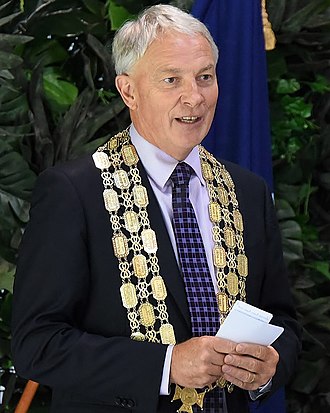
Auckland Mayor Phil Goff [pictured above] said the commemoration was about remembering the victims and the survivors of the Holocaust and their incredible suffering.
“We remember those who risked their lives to save Jewish people. We remember with shame how our countries closed their borders and left people struggling with persecution, left them to their fates.
“We remember the thinking and behaviour that led to the Holocaust – racism, populism and extreme nationalism – and how these things can be used for reasons of political opportunism.”
While it would be nice to relegate the thinking of the Holocaust to being from a time that has passed, sadly such ways of thinking persist to this day, he said.
Some recent examples of where that leads were Pol Pot and the Khmer Rouge in Cambodia, Rwanda, Sudan and, currently, the Uyghurs in China. The Christchurch mosque attacks in 2019 were also motivated by hate.
“We acknowledge that anti-semitism has led to the persecution of Jewish people over the centuries, and that it’s not going away, it’s growing.”
This all left him asking how it was best to respect and honour the memories of those who were persecuted and lost their lives in the Holocaust, Mayor Goff said.
“We do it by remembering the lessons of history and speaking out against bigotry, intolerance, hatred and racism. Most people are good at heart, but all it takes for evil to succeed is for those good people to stay silent. We can’t sit silently.”
Aucklanders should be proud of their multicultural city, in which over 40% of the population was born overseas, and where everyone, by and large, lives in mutual harmony and treats each other with respect, he said.
“But that will persist only if we stand up for our democracy and the human rights that we hold dear. The best way to honour Holocaust victims and survivors, and to respect their memory, is by standing up for our belief that all human beings are worthy of being treated with dignity and respect.”
Mayor Goff also acknowledged the huge contribution of Holocaust refugees to New Zealand.
Chaired by NZ Jewish Council spokesperson Juliet Moses, this year’s commemoration featured the speeches by the Governor-General, Mayor Goff and Hart as well as one by Helen Klisser (daughter of the mastermind behind Vogels Bread, Johan Klisser).
The event also included a candle lighting ceremony, several photo tributes to New Zealand’s Holocaust survivors, a reading from Hans Johnson’s (Jottkowitz) experience arriving in New Zealand, a violin performance of the Schlinder’s List theme by Cin Papali’i-Curtin and memorial prayers by Rabbi Friedler.
Alongside the Governor-General and Mayor Goff, the commemoration was attended by Labour MP Vanushi Walters, National MP’s Chris Penk and Melissa Lee, ACT MP Brooke van Velden, Auckland Deputy Mayor Bill Cashmore, several councillors from Auckland Council, and diplomats from a range of different countries.
UN International Holocaust Remembrance Day commemorations were also held in Hamilton, Napier, Wellington and Christchurch.


